Search Posts
Recent Posts
- Senior Agenda Coalition of RI pushes wealth tax to fund programs for older residents – Herb Weiss June 2, 2025
- How will Artificial Intelligence (AI) impact the future of work – Mary T. O’Sullivan June 2, 2025
- Real Estate in RI: Tiverton contemporary for $1.27M June 2, 2025
- Our Networking Pick of the Week: Coffee Hour at Provence Sur Mer, Newport June 2, 2025
- Rhode Island Weather for June 2, 2025 – Jack Donnelly June 2, 2025
Categories
Subscribe!
Thanks for subscribing! Please check your email for further instructions.
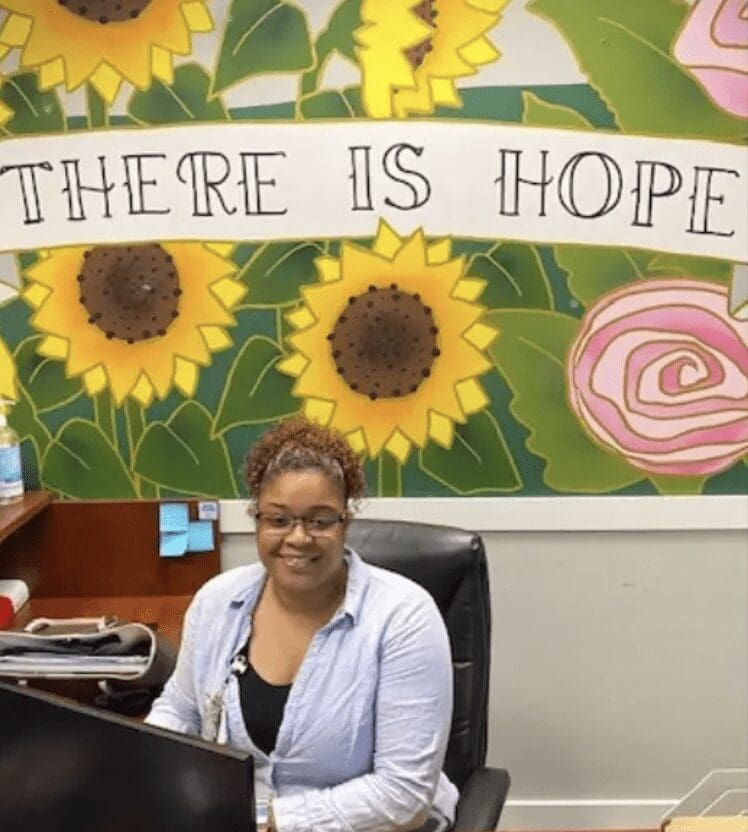
Recovery Month – 4 Rhode Islanders in recovery, paying it forward
September is Recovery Month. Featuring the real stories of real people is one way we can all see that recovery is actually possible. These four stories are all compelling stories of real people – who all now work to help others who are struggling on their recovery road.
Jessica Jones-Supple, Community Care Alliance, Woonsocket

“I had no idea I could have a career from the darkest time of my life.”
It’s fair to say that Jessica Jones-Supple knows her way around Woonsocket. “I grew up here, got addicted here, and now I’m doing the work here.” That work involves helping others who are living with a substance use condition as a peer recovery specialist with Community Care Alliance (CCA).
Jessica is open about sharing her own journey. Despite a family history of substance use, she was a good student, earning high grades and taking college courses. However, at around age 23, she needed surgery and was prescribed an opioid pain medication upon leaving the hospital. This led to her becoming opioid dependent for about five years and resulted in her first admission to a residential treatment facility on Cape Cod. She was there for six months “but the same day I got out, I went and got pills.”
Shortly after that, her sister introduced her to heroin, and she began snorting the drug. Quickly becoming addicted, she engaged in behavior that she says, “comes with the drug use,” and led to periods of homelessness, arrests and other dangerous lifestyle choices. Married with young children at the time, she says her turning point came when her husband threatened to leave and take the children if she didn’t get help.
In 2014, she went to Discovery House, which put her on the path to sobriety. “The first two years were tough. There were a lot of ups and downs,” she says. Among the “downs” was the death of her sister and her father from drug use. However, she says she was able to rebuild her relationship with her husband, children, and other family members, and to get her life back to a place of positivity.
In recovery for nine years now, Jessica acknowledges that every day is still a challenge and sometimes, a struggle. “Recovery is about learning and relearning myself. I have to re-center myself and remember gratitude.”
Jessica notes how big a part that judgment and stigma play in recovery. She despises the term “junkie,” equating it with “junk – like the people are ‘trash.’ These are human beings who still have feelings and emotions.” When doing outreach, she notes, “Sometimes, if you just take someone’s hand and offer a small kindness, it can go a long way.”
As part of her recovery efforts, Jessica became involved in Woonsocket’s Health Equity Zone (HEZ), eventually earning a stipend for her work there. With her evident passion to help others, she was invited to take CCA’s certified peer recovery course, completing it about a year ago. Since that time, she has been doing outreach in her hometown, sometimes interacting with some of the same people that she hung around and slept outside with during her years of drug use. She helped with CCA’s Safe Haven winter shelter and was recently granted the opportunity to run a NA/AA nighttime meeting group with fellow peer recovery support specialist Peter Daignault at 46 Arnold Street in Woonsocket.
“Recovery is my passion. My life. I know I can’t save everybody, but if I can save just one,” she says.
___
Victor Lambert – PSNRI
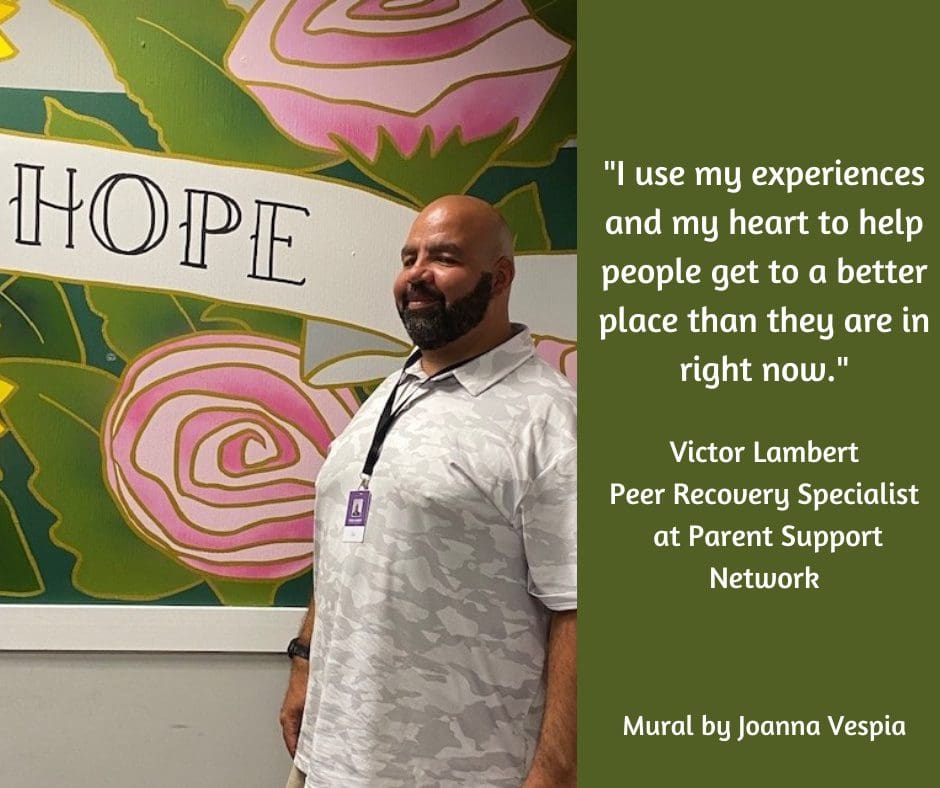
“I use my experiences and my heart to help people get to a better place than they are in right now.”
With his engaging smile and upbeat personality, it doesn’t take long for Victor Lambert to win somebody over. Add in his openness about a history of substance use and you have an effective peer recovery support specialist.
A peer recovery specialist with Parent Support Network of Rhode Island (PSNRI) for a year now, Victor says he loves his job and the work he does – especially the outreach. “I have a talent with the human connection. The people I work with in out in the community – some can be stand-offish at first but then I speak to them about my lived experience: using, being homeless – they see it,” he says.
Victor first experimented with cocaine and other drugs as an 18-year-old college freshman and then moved on to heroin, which he used for most of his adult life.
He says he doesn’t really know why he started using drugs. He grew up with a single mother, who he described as “always loving and supportive,” and two sisters in Newport. It wasn’t until he experienced the freedom of living away at college that he began dabbling in drugs that were available around campus.
A cook since age 15, he held jobs as a sous chef at many Newport restaurants. The schedule helped hide his substance use and it became costly. “I would work 70 hours a week, get a $1,200 paycheck, and then be asking someone for a cigarette the next day. It would all be gone.” He then moved to Fort Lauderdale and continued the lifestyle. “I managed, until I couldn’t anymore,” he says.
A spiral that ended in an arrest and incarceration served as a turning point for Victor. “When my sisters came to see me (in prison), they had tears in their eyes. It made me feel disgusted. I turned my life around.”
Through counseling, Victor learned how to live on a path of recovery and build his self-confidence. He is proud of what he has accomplished and has rebuilt relationships with his family. “That was precious for me.” His participation in a post-prison program led to his taking the Certified Peer Recovery Specialist (CPRS) training. “It was like I was meant for it. It was so awesome!” he stated.
Victor now works two days a week at the PSNRI Newport Center, hosting groups and one-on-one counseling sessions. He spends the other three days as a mobile outreach worker, talking to people and providing them with clean smoking kits, fentanyl test strips, naloxone training, and, if needed, transports to medical and recovery centers. “That’s my heart and soul,” he says, of the outreach work.
Now 48, Victor says, “I consider myself very grateful. And I really love seeing the people that I help grow.”
___
Michela “Kayla” Serrano – PSNRI – Workforce Development Coordinator; dual-certified Peer Recovery Specialist/Community Health Worker
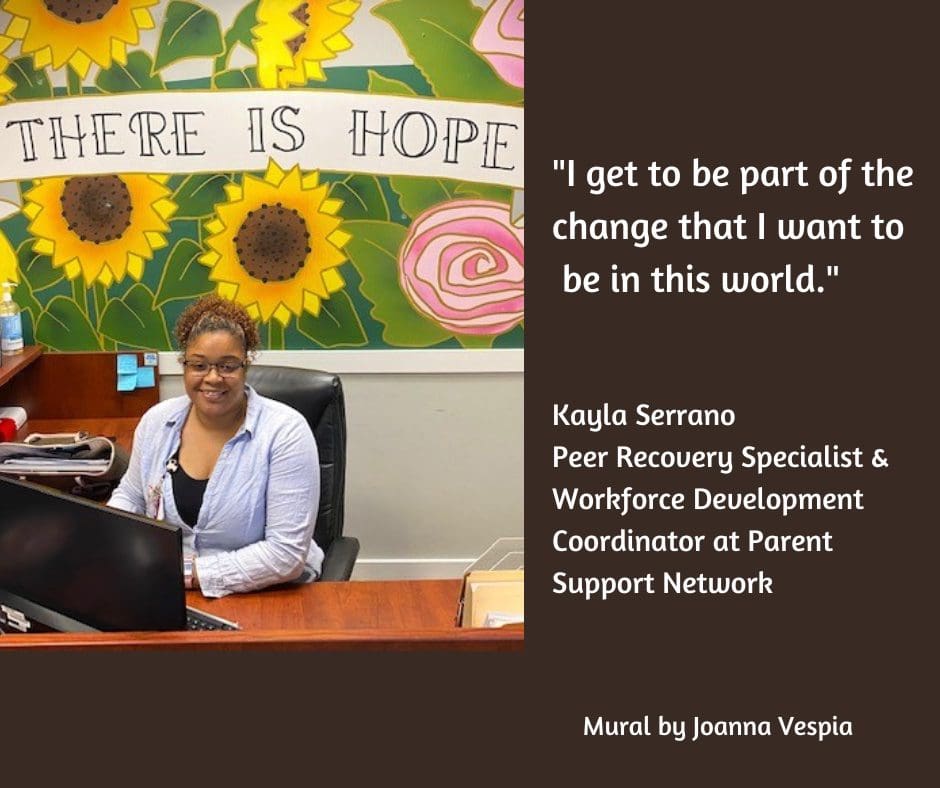
“I get to be part of the change that I want to be in this world.”
Kayla, a mother of two, has been working in peer recovery since 2021, a job that she says she landed due to a “a stroke of luck.” She has held jobs in the medical field but is also a survivor of domestic violence, has experienced homelessness, and grew up with a mother who has a mental health and a substance use condition.
Kayla took PSNRI’s 70-hour training to become dual certified as a Peer Recovery Specialist/Community Health Worker. It led to a job she has a passion for and one she thinks she was called to do – encouraging and supporting others. “I love seeing the look on someone’s face when they graduate from our dual certification program,” she says.
Kayla notes the importance of the PSNRI peer recovery specialists to have “lived” experience when providing outreach and support to people who are actively using drugs or other substances and are homeless. “It’s totally different to have walked in those shoes. To understand why some people feel better sleeping in a tent in the woods than in a shelter because of the things that go on sometimes. It helps with gaining trust.”
Kayla says she loves the PSNRI community and her work with the organization, especially “the feeling that I get when I know we have helped someone.” She adds, “We cannot fill every need, but we can damn sure try!”
___
Cecelia “Cece” Alston – Community Care Alliance, Woonsocket – Peer Recovery Specialist
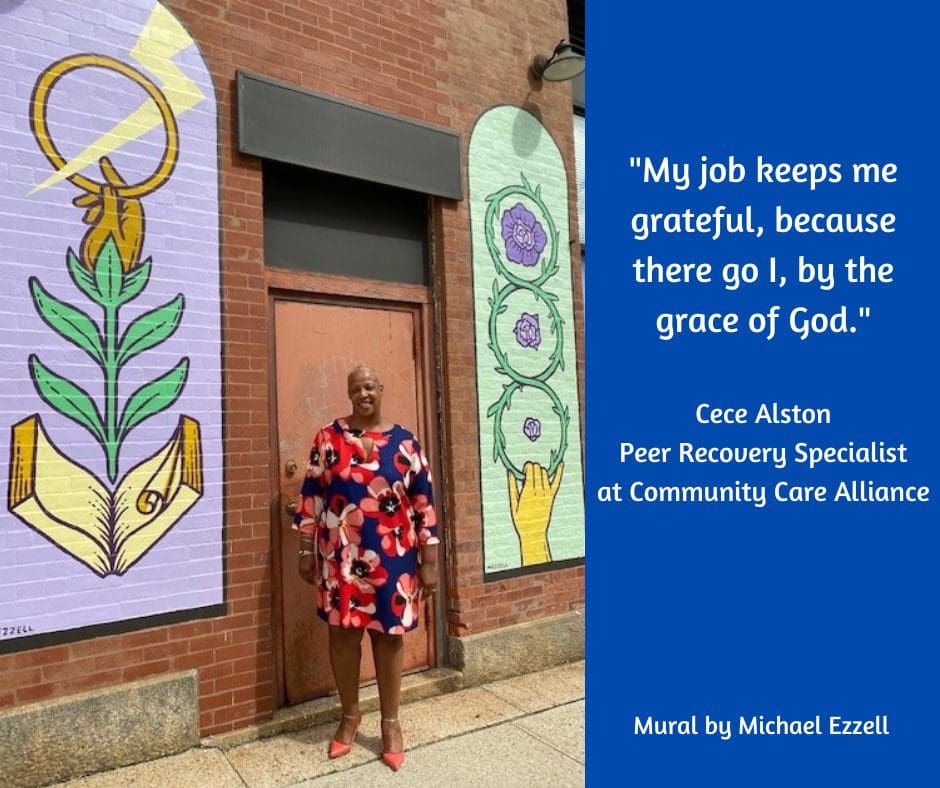
“My job keeps me grateful, because there go I, by the grace of God.”
It’s been almost three decades, and yet Cecelia “Cece” Alston clearly remembers the moment that changed her life dramatically. She was at a house party in Providence where people were taking turns snorting cocaine. “It became my turn, and I was immediately hooked. The very next day, I stole money out of my mom’s purse to buy more,” she says.
Cece quickly went from being a young woman with dreams of being a flight attendant to a person who was constantly in need of money for her increased drug use. She was soon evicted from her apartment and then lost custody of her first child. “I lived on the street and worked the street. I lived in abandoned houses and slept in my car. Things got crazy so fast,” she notes.
During her years of using drugs, which included bouts of homelessness and arrests, Cece says she made numerous attempts to stay substance free. She estimates that she went to “10 detoxes and seven rehabs.” And each time, she went back to cocaine. “I had to get high to do everything.”
Cece noted that in most of her earlier detoxification experiences, she didn’t receive anything to aid with withdrawal or cope with the physical and emotional feelings afterwards. However, after several years of getting help at local detoxification and rehabilitation centers, she began her long-term recovery journey. Returning to school, she eventually earned a degree in social work. “I wanted to know why I used drugs,” she said, of her quest for education.
While she doesn’t understand all the reasons for her substance use, Cece said that growing up in a rough housing development was a big factor, as was the lack of a positive male role model. While she had the support of a loving, hardworking mother, she said the loss of a beloved uncle through murder rocked the family and had a debilitating effect on her and her two siblings – both of whom also turned to drugs. “All we knew was pimps and prostitutes. We had no one to look up to,” Cece shared.
Now 27 years in recovery, Cece says she still takes life “one day at a time.” But that life is full. She is happily married and has long been reunited with her children, who are now adults. She is also fulfilled by her work as a peer recovery specialist for Community Care Alliance (CCA) in Woonsocket.
Cece says she looks forward to her job each day, where she goes out into the community to “meet people where they are at.” This means engaging in conversation, providing a snack, clothing or toiletry item, and sometimes helping someone find shelter, medical attention, or recovery support.
In her outreach work, Cece knows the importance of treating people with respect, relaying her own experiences, and overall, being “a friendly face.” However, she also notes that one of the biggest barriers to recovery is lack of affordable housing. “If someone has a place to go from 9 a.m. to 4 p.m. but then no place after that, how can they get clean?” she asks.
However, Cece remains upbeat about outreach and her role in the recovery community. “I say to people, ‘You can be me, but it’s going to take work. It’s hard.’ But I believe everybody has a chance to become clean.”
___
September is National Recovery Month. Founded in 1989 and launched by the Substance Abuse and Mental Health Services Administration (SAMSHA), National Recovery Month celebrates those living in recovery, while recognizing workers who make it all possible.
Listen to Tom Coderre, from Rhode Island, who is now the Acting Deputy Assistant Secretary for Mental Health and Substance Use, SAMHSA.
Participate in the September 30th SAMHSA event – here, with a LIVE Facebook discussion at 1:15pm:
https://www.facebook.com/samhsa
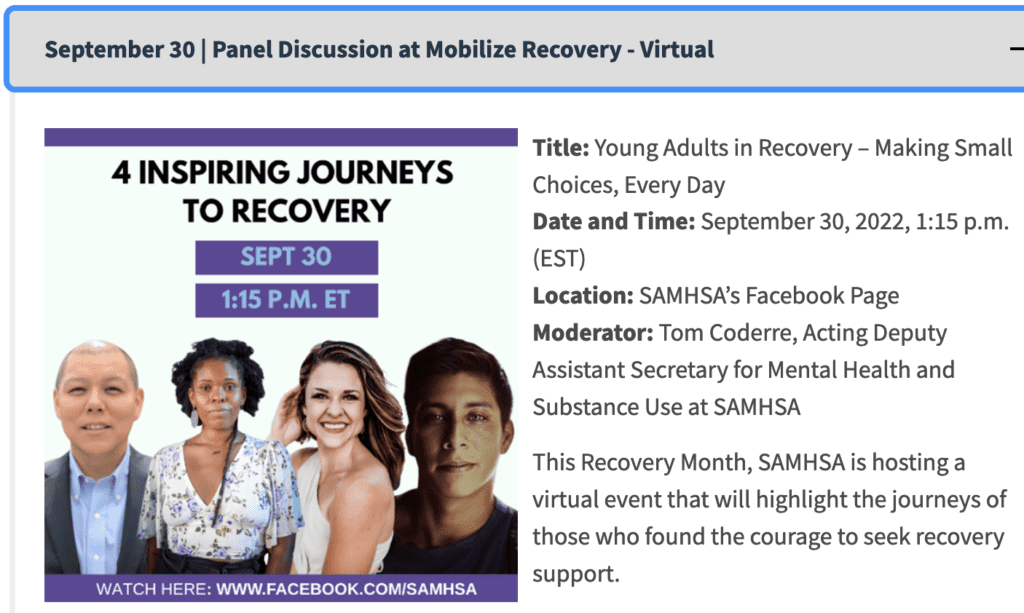
Thank you to the RI Department of Health for sharing the stories, above.
